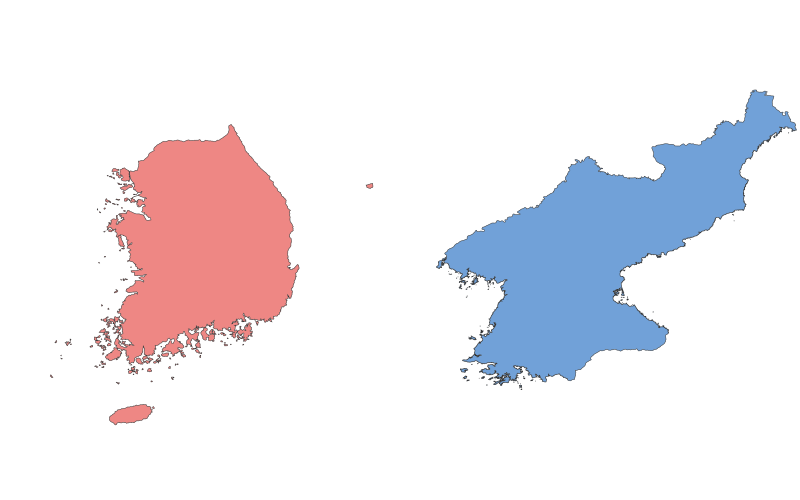South Korea vs. North Korea: A Geographical Comparison

Comparative Table
| Category | South Korea | North Korea |
|---|---|---|
| Location | Southern part of the Korean Peninsula | Northern part of the Korean Peninsula |
| Size | 100,363 sq km | 120,540 sq km |
| Climate | Temperate, with four distinct seasons | Temperate, with colder winters and hot summers |
| Natural Resources | Limited; coal, tungsten, graphite | Abundant; coal, iron ore, limestone, magnesite |
| Urban Development | Highly urbanized (e.g., Seoul, Busan) | Less urbanized; Pyongyang is the major city |
| Transportation | Advanced infrastructure (high-speed rail, highways) | Limited infrastructure; reliance on railways |
Description
South Korea
South Korea, officially the Republic of Korea (ROK), is a vibrant democracy with a highly developed economy. It is known for its technological advancements, global brands like Samsung and Hyundai, and a rich cultural heritage, including traditions like Hanbok and K-pop. The capital, Seoul, is a bustling metropolis blending modernity with historical sites like Gyeongbokgung Palace. South Korea's economy is export-driven, focusing on electronics, automobiles, and shipbuilding.
Historically, South Korea emerged after the division of Korea in 1945 and the Korean War (1950–1953). It has since transformed from a war-torn nation into a global economic powerhouse, with a strong emphasis on education and innovation.
North Korea
North Korea, officially the Democratic People's Republic of Korea (DPRK), is a highly centralized and isolated state under authoritarian rule. Its economy is heavily controlled by the government, with limited international trade due to sanctions. The capital, Pyongyang, showcases monumental architecture like the Juche Tower, reflecting the state's ideology.
North Korea's history is marked by its division from South Korea and the Korean War. The country remains one of the most secretive in the world, with a focus on military development (including nuclear programs) and self-reliance (Juche ideology). Culturally, it emphasizes loyalty to the ruling Kim dynasty and state propaganda.
Key Differences
While both Koreas share a common history and ethnic background, their post-war trajectories have diverged dramatically. South Korea thrives as a global economic and cultural hub, while North Korea remains isolated, with a focus on military and political control. The geographical differences, such as urbanization and resource distribution, further highlight the contrasts between the two nations.